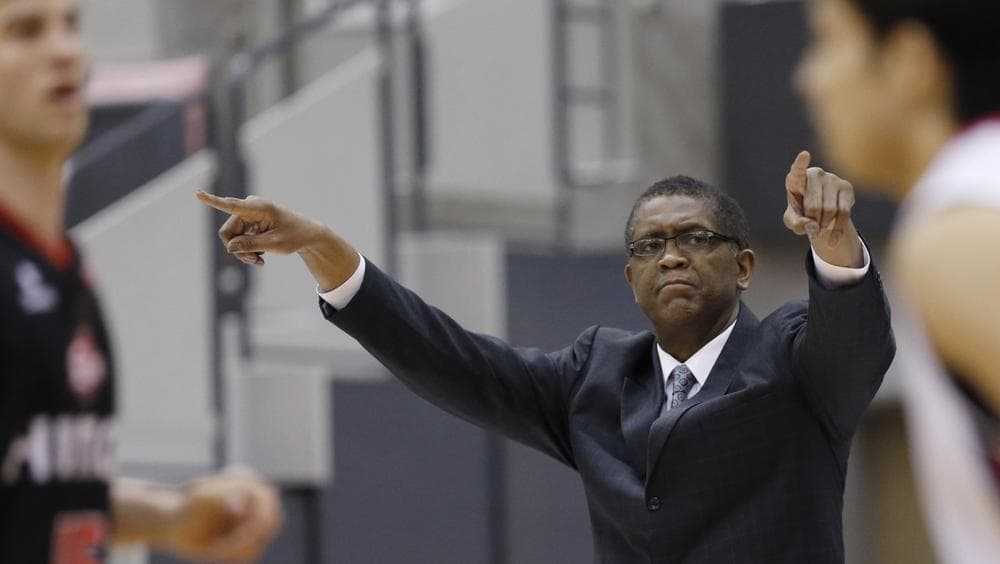Advertisement
Interview
NBA’s Cartwright Coaches In Japan

Bill Cartwright’s career as an NBA center spanned from 1979 to 1995. He appeared in an NBA All-Star game for the New York Knicks and played on three of the Chicago Bulls’ championship teams. As an assistant coach, he contributed to two more of Chicago’s titles. He later served as the Bulls’ head coach. But recently Cartwright accepted a different challenge: taking over as head coach of a team off to a 5-19 start ... in Japan. He wrote about the experience in a column for SI.com and joined Bill Littlefield on Only A Game.
BL: Your basketball experience speaks for itself, but you do not speak Japanese. How did you end up taking the job with the Basketball Japan League of Osaka?
BC: It just turned out that I was not coaching in the NBA. I was off, and it was really around December that I was contacted by this Japanese team in Osaka who had lost their coach. I have always wanted to go to that part of the world, and I love adventures.
BL: In your column, you write: “Basketball is probably the sixth favorite sport in Japan behind baseball, sumo, soccer, gymnastics and ping pong.” But you got a warm reception, right?
[sidebar title="Western Athletes In Japan" align="right"]Curacao native Wladimir Balentien has broken Sadaharu Oh's Japanese single-season home run record. We spoke to Jason Coskrey of the Japan Times about the achievement.[/sidebar]BC: They do love basketball over there. They love the NBA. They love NBA stars. They definitely know who everybody is, but in their culture, in their society basketball is just not the everyday sport. Like out here you'll see baskets everywhere. You'll see them in the park. You'll see them in people's driveways. It's not that way over there.
BL: You write that you quickly realized interpreters were your lifeline. Tell me a little bit about working with those interpreters during your season with the Osaka Evessa.
BC: The interesting thing is that when you are making an interpretation from English to Japanese, it can be a very long process. So you may be able to say a couple lines and they're talking for three or four minutes. I'm asking my assistant coaches, 'What's he saying? I didn't say anything.' But the interpretation of what you're saying could be twice as long.
BL: There are international players, including some Americans, in the Basketball Japan League, but coaches can’t just rely on guys who narrowly missed out on a NBA career. Tell us a little about the restrictions that you faced as a coach.
BC: You could have four Americans on your team. We had eight Japanese. But in the first and third quarter you could only play two Americans. In the second and fourth quarter, you could play three. So, it was always kind of a juggling act to see which one of your Japanese players fit with the American players and vice versa. It was a great process. I really enjoyed that part of it.
BL: For fans used to watching college and the NBA here in U.S., what else is different about the game that they would see in Japan?
BC: It's very similar. The crowds there, even though they are small, they are very excitable similar to a college team. It's a great environment. It's very, very similar to college.
BL: As we mentioned earlier, when you arrived the Osaka Evessa were off to a 5-19 start. How did things turn out by the end of the season?
BC: We just missed the playoffs. We had a really nice run. We ended up winning 10 games in a row, but I think the bigger picture was that our guys were able to come in; they were able to enjoy playing basketball; and we really learned how to function as one unit. Which was a great thing considering our Japanese players did not speak English very well and of course our American players did not speak Japanese at all.
Just to be able to come in and bond that way and then give them some ownership to go into a timeout and ask, 'Hey look, what do you guys want to do defensively? Offensively what do you guys want to run?" and give them some ownership, something they've never had before. All of that by the end of the season was a victory.
BL: If the call comes from Osaka or another team in the basketball Japan league, are you ready to go back and do it again?
BC: I don't know about now. I've always kind of gone with where I've been led. I kind of believe there's kind of a plan for me and perhaps if that's where I should be then that's where I'll go.
BL: Bill Cartwright, thank you very much for speaking with me. This was fun.
BC: Thanks a lot. I appreciate it. And I think everybody should get over there to Japan. I'm telling you, that was a great experience. It's a great country, great food. I really enjoyed it over there.
This segment aired on September 21, 2013.